初中英语语法的八种时态的具体用法
英语中常见的八大时态(结构及用法)
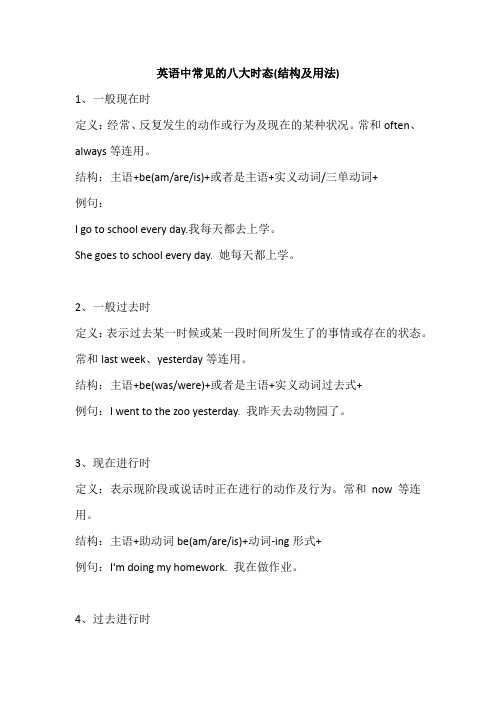
英语中常见的八大时态(结构及用法)1、一般现在时定义:经常、反复发生的动作或行为及现在的某种状况。
常和often、always等连用。
结构:主语+be(am/are/is)+或者是主语+实义动词/三单动词+例句:I go to school every day.我每天都去上学。
She goes to school every day. 她每天都上学。
2、一般过去时定义:表示过去某一时候或某一段时间所发生了的事情或存在的状态。
常和last week、yesterday等连用。
结构:主语+be(was/were)+或者是主语+实义动词过去式+例句:I went to the zoo yesterday. 我昨天去动物园了。
3、现在进行时定义:表示现阶段或说话时正在进行的动作及行为。
常和now等连用。
结构:主语+助动词be(am/are/is)+动词-ing形式+例句:I'm doing my homework. 我在做作业。
4、过去进行时定义:表示在过去某个时间点发生或进行的行为的事情。
常和at this time yesterday等或以when引导的谓语动词连用。
结构:主语+助动词be(was/were)+动词-ing形式+例句:When I got to the top of the mountain, the sun was shining. 我到达山顶时,阳光灿烂。
5、现在完成时定义:表示过去发生的动作对现在造成的影响或结果或过去的动作或状态持续到现在。
构成:主语+助动词(have/has)+动词过去分词+例句:I have lived here for more than twenty years. 我住在这儿二十多年了。
6、过去完成时定义:表示在过去某一时刻或动作以前完成了的动作,也可以说过去的时间关于过去的动作。
构成:主语+助动词(have/has)+动词过去分词+例句:She said she had never been to Paris. 她告诉我她曾去过巴黎。
初中英语必考八大时态结构及用法详解
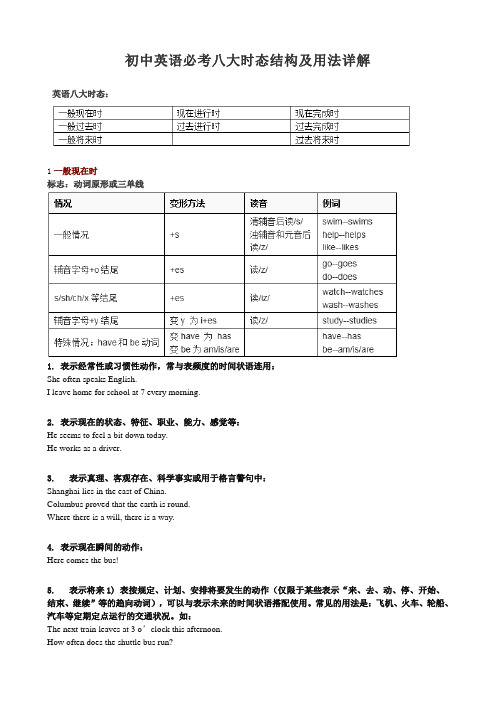
初中英语必考八大时态结构及用法详解英语八大时态:1一般现在时标志:动词原形或三单线1. 表示经常性或习惯性动作,常与表频度的时间状语连用:She often speaks English.I leave home for school at 7 every morning.2. 表示现在的状态、特征、职业、能力、感觉等:He seems to feel a bit down today.He works as a driver.3. 表示真理、客观存在、科学事实或用于格言警句中:Shanghai lies in the east of China.Columbus proved that the earth is round.Where there is a will, there is a way.4. 表示现在瞬间的动作:Here comes the bus!5. 表示将来1) 表按规定、计划、安排将要发生的动作(仅限于某些表示“来、去、动、停、开始、结束、继续”等的趋向动词),可以与表示未来的时间状语搭配使用。
常见的用法是:飞机、火车、轮船、汽车等定期定点运行的交通状况。
如:The next train leaves at 3 o’clock this afternoon.2) 在时间和条件状语从句中常使用一般现在时表示将来发生的事情:When Bill comes (不用will come), ask him to wait for me.I shall go there tomorrow unless I’m too busy.2一般过去时标志:动词过去式*闭音节:元音字母a, e, i, o, u如果发字母本来的音则称为开音节,否则称为闭音节。
1. 表示过去某时所发生的动作或存在的状态,常与表示过去的时间状语连用(e.g. yesterday, this morning, just now, a moment ago, in May, last night / year / week, once upon a time, the other day, before …, when …, in the past等)。
初中英语八大时态结构及用法
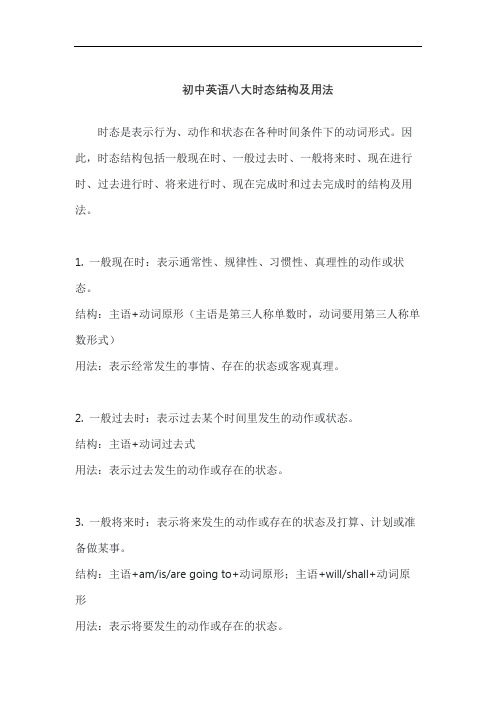
初中英语八大时态结构及用法时态是表示行为、动作和状态在各种时间条件下的动词形式。
因此,时态结构包括一般现在时、一般过去时、一般将来时、现在进行时、过去进行时、将来进行时、现在完成时和过去完成时的结构及用法。
1. 一般现在时:表示通常性、规律性、习惯性、真理性的动作或状态。
结构:主语+动词原形(主语是第三人称单数时,动词要用第三人称单数形式)用法:表示经常发生的事情、存在的状态或客观真理。
2. 一般过去时:表示过去某个时间里发生的动作或状态。
结构:主语+动词过去式用法:表示过去发生的动作或存在的状态。
3. 一般将来时:表示将来发生的动作或存在的状态及打算、计划或准备做某事。
结构:主语+am/is/are going to+动词原形;主语+will/shall+动词原形用法:表示将要发生的动作或存在的状态。
4. 现在进行时:表示现阶段或说话时正在进行的动作及行为。
结构:主语+am/is/are+现在分词用法:表示正在进行的动作。
5. 过去进行时:表示过去某段时间或某一时刻正在发生或进行的动作或行为。
结构:主语+was/were+现在分词用法:表示过去正在进行的动作。
6. 将来进行时:表示将来某一时刻正在进行的动作,或表示要在将来某一时刻开始,并继续下去的动作。
结构:主语+shall/will+be+现在分词用法:表示将来正在进行的动作。
7. 现在完成时:表示过去发生的动作对现在造成的影响或结果,或表示过去的动作或状态持续到现在。
结构:主语+have/has+过去分词用法:表示已经完成的动作或存在的状态。
8. 过去完成时:表示在过去某一时刻或动作以前已经完成了的动作或存在的状态。
结构:主语+had+过去分词用法:表示过去已经完成的动作。
英语中八种时态的具体用法

英语中八种时态的具体用法(1)一般现在时表示现阶段经常或习惯发生的动作或存在的状态,或说明主语的特征。
①一般现在时句子中常有的时间状语:often,usually,sometimes,always,every(day等),once/twice,a (week等), on (Sunday等),never,in the(morning等)。
如:They go to the Palace Museumonce a year.(他们每年去一次故宫)/ They oftendiscuss business in the evening.(他们经常在晚上商谈生意)②表示客观真理、事实、人的技能或现在的状态时句子里一般不用时间状语。
如:The earth turns round thesun.(地球绕着太阳转)/ Light travels faster thansound.(光传播比声音快)③表示十分确定会发生(如安排好的事情)或按照时间表进展的事情,用一般现在可以表达将来,句子中可以有将来时间。
如:The train for Haikou leaves at 8:00 in themorning.(开往汉口的列车上午8点开车)④在时间状语从句中(以when, after, before, while, until,as soon as等引导)与条件状语从句中(以if,unless引导),用一般现在时代替一般将来时,句子可以有将来时间。
如:Please ring me up as soon as you arrive inGermany.(你一到德国就给我打)/ If it rainstomorrow,we will have to stay at home.(如果明天下雨我们就只好呆在家)⑤一般现在时用于倒装句中可以表示正在发生的动作,动词以come, go为主。
如:Here comes the bus. (车来了)/ There goes the bell.(铃响了)。
初中英语时态8种基本时态讲解
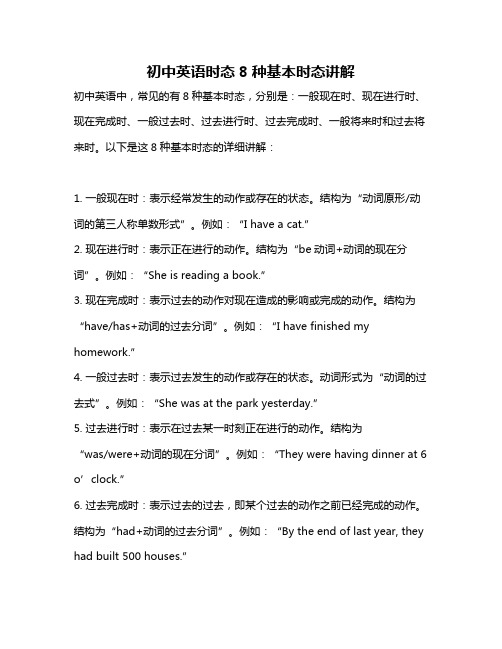
初中英语时态8种基本时态讲解初中英语中,常见的有8种基本时态,分别是:一般现在时、现在进行时、现在完成时、一般过去时、过去进行时、过去完成时、一般将来时和过去将来时。
以下是这8种基本时态的详细讲解:1. 一般现在时:表示经常发生的动作或存在的状态。
结构为“动词原形/动词的第三人称单数形式”。
例如:“I have a cat.”2. 现在进行时:表示正在进行的动作。
结构为“be动词+动词的现在分词”。
例如:“She is reading a book.”3. 现在完成时:表示过去的动作对现在造成的影响或完成的动作。
结构为“have/has+动词的过去分词”。
例如:“I have finished my homework.”4. 一般过去时:表示过去发生的动作或存在的状态。
动词形式为“动词的过去式”。
例如:“She was at the park yesterday.”5. 过去进行时:表示在过去某一时刻正在进行的动作。
结构为“was/were+动词的现在分词”。
例如:“They were having dinner at 6 o’clock.”6. 过去完成时:表示过去的过去,即某个过去的动作之前已经完成的动作。
结构为“had+动词的过去分词”。
例如:“By the end of last year, they had built 500 houses.”7. 一般将来时:表示将来要发生的动作或存在的状态。
结构为“will+动词原形”或“am/is/are going to+动词原形”。
例如:“We will visit the museum next week.”8. 过去将来时:表示从过去的某一时刻看,将来要发生的动作或存在的状态。
结构为“would+动词原形”或“was/were going to+动词原形”。
例如:“He said he would come back soon.”以上就是初中英语8种基本时态的讲解,希望对你有帮助!。
8个初中英语时态

8个初中英语时态8个初中英语时态是学习英语语法的重要组成部分,以下是它们的定义和例句:1. 现在一般时态:表示现在的动作或状态。
例如:I eat an apple every day. (我每天吃一个苹果。
)2. 过去一般时态:表示过去的动作或状态。
例如:She studied English last year. (她去年学了英语。
)3. 现在进行时态:表示正在进行的动作或状态。
例如:He is watching TV now. (他正在看电视。
)4. 过去进行时态:表示过去某个时间正在进行的动作或状态。
例如:They were having dinner when I called. (我打电话的时候他们正在吃饭。
)5. 现在完成时态:表示已经完成的动作或状态,强调对现在的影响。
例如:I have learned English for three years. (我已经学了三年英语了。
)6. 过去完成时态:表示过去某个时间之前已经完成的动作或状态。
例如:They had finished their homework by the time I arrived. (我到的时候他们已经完成作业了。
)7. 现在完成进行时态:表示从过去开始一直持续到现在的动作或状态,强调对现在的影响。
例如:He has been studying English for five years. (他已经学了五年英语了。
)8. 过去完成进行时态:表示从过去某个时间开始一直持续到过去的动作或状态。
例如:They had been waiting for the bus for an hour when I arrived. (我到的时候他们已经等了一个小时的车了。
)。
初中英语八种时态详解

初中英语八种时态详解一.一般现在时一.要点提示一般现在时主要用动词原形表示,但是当主语是第三人称单数或者单数名词时,动词的形式要发生变化,其变化规律是:1. 一般动词后加-s, 如:wears, reads, plays, likes, 2.以s, x, ch, sh结尾,后加-es, 如:watches, brushes, 3.以辅音字母+o结尾,一般加-es, 如:goes, does, 4.辅音字母+y 结尾,变y为i,再加-es, 如:worries, carries. Be动词一般现在时的特殊形态是:am, is, are。
Have的第三人称单数是has。
二.用法指南一般现在时的用法1) 表示经常性或习惯性的动作,常与表示频度的时间状语连用。
时间状语:always总是, often经常,usually通常, seldom很少, never从不, sometimes有时(以上频度副词位置放于行为动词之前), every…每…(放于句首或者句末均可)I leave home for school at 7 every morning.It often snows here.2) 表示现在的状态、特征、能力、性格等。
I know him very well.Ann Wang writes good English but does not speak well.3) 表示格言或警句中。
Pride goes before a fall. 骄者必败。
Failure is the mother of success. 失败是成功之母。
4) 表示客观真理,客观存在,科学事实。
The earth moves around the sun.Shanghai lies in the east of China.三. 一般现在时态的肯定形式,否定形式及疑问形式肯定形式是用动词原形,be动词用am, is, are, 注:动词的第三人称单数形式的变化;否定形式是在be动词后加否定词not(缩写成isn’t, aren’t, am与not不能缩写),或者添加助动词do/does加not再加动词原形(缩写成don’t/doesn’t).疑问形式是把be动词或助动词do/does提置句首, 动词还原,句末问号,人称上第一人称变第二人称,第二人称变第一人称,第三人称不变。
英语八大时态总结
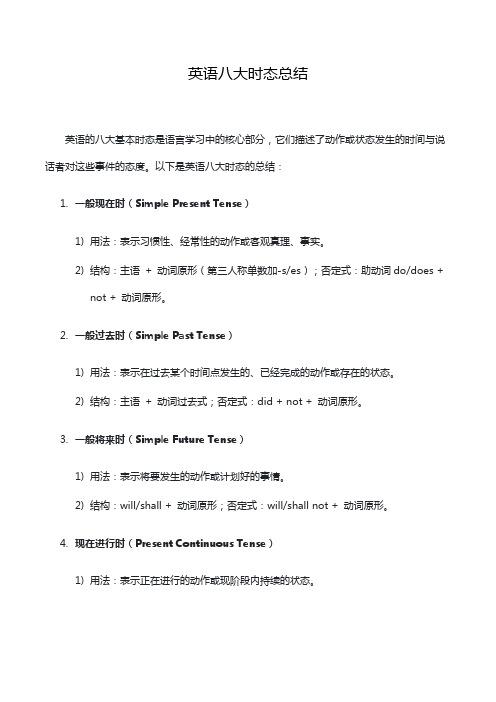
英语八大时态总结英语的八大基本时态是语言学习中的核心部分,它们描述了动作或状态发生的时间与说话者对这些事件的态度。
以下是英语八大时态的总结:1.一般现在时(Simple Present Tense)1)用法:表示习惯性、经常性的动作或客观真理、事实。
2)结构:主语+ 动词原形(第三人称单数加-s/es);否定式:助动词do/does +not + 动词原形。
2.一般过去时(Simple Past Tense)1)用法:表示在过去某个时间点发生的、已经完成的动作或存在的状态。
2)结构:主语+ 动词过去式;否定式:did + not + 动词原形。
3.一般将来时(Simple Future Tense)1)用法:表示将要发生的动作或计划好的事情。
2)结构:will/shall + 动词原形;否定式:will/shall not + 动词原形。
4.现在进行时(Present Continuous Tense)1)用法:表示正在进行的动作或现阶段内持续的状态。
2)结构:am/is/are + 动词-ing形式;否定式:am/is/are + not + 动词-ing形式。
5.过去进行时(Past Continuous Tense)1)用法:表示过去某段时间内正在进行的动作或背景。
2)结构:was/were + 动词-ing形式;否定式:was/were + not + 动词-ing形式。
6.现在完成时(Present Perfect Tense)1)用法:表示过去发生的动作对现在的影响或从过去一直持续到现在的情况。
2)结构:have/has + 过去分词;否定式:have/has + not + 过去分词。
7.过去完成时(Past Perfect Tense)1)用法:表示在过去的某一时间之前已经完成的动作。
2)结构:had + 过去分词;否定式:had + not + 过去分词。
8.将来完成时(Future Perfect Tense)1)用法:表示在将来某一时刻之前将要完成的动作。
- 1、下载文档前请自行甄别文档内容的完整性,平台不提供额外的编辑、内容补充、找答案等附加服务。
- 2、"仅部分预览"的文档,不可在线预览部分如存在完整性等问题,可反馈申请退款(可完整预览的文档不适用该条件!)。
- 3、如文档侵犯您的权益,请联系客服反馈,我们会尽快为您处理(人工客服工作时间:9:00-18:30)。
初中英语语法的八种时态的具体用法:一般现在时表示现阶段经常或习惯发生的动作或存在的状态,或说明主语的特征。
①一般现在时句子中常有的时间状语:often,usually,sometimes,always,every (day 等), once/twice,a (week等), on (Sunday等),never,in the (morning等)。
如:They go to the Palace Museum once a year.(他们每年去一次故宫)/ They often discuss business in the evening.(他们经常在晚上商谈生意)②表示客观真理、事实、人的技能或现在的状态时句子里一般不用时间状语。
如:The earth turns round the sun.(地球绕着太阳转)/ Light travels faster than sound.(光传播比声音快)③表示十分确定会发生(如安排好的事情)或按照时间表进行的事情,用一般现在可以表达将来,句子中可以有将来时间。
如:The train for Haikou leaves at 8:00 in the morning.(开往汉口的列车上午8点开车)④在时间状语从句中(以when, after, before, while, until, as soon as等引导)和条件状语从句中(以if,unless引导),用一般现在时代替一般将来时,句子可以有将来时间。
如:Please ring me up as soon as you arrive in Germany.(你一到德国就给我打电话) / If it rains tomorrow,we will have to stay at home.(如果明天下雨我们就只好呆在家)⑤一般现在时用于倒装句中可以表示正在发生的动作,动词以come, go为主。
如:Here comes the bus. (车来了) / There goes the bell.(铃响了)。
⑥一般现在时常用于体育比赛的解说或寓言故事中。
Now the midfield player catches the ball and he keeps it.⑦人的心理活动和感官动作一般用一般现在时而不用现在进行时表达,常见动词有:like, love, hate, dislike, want, wish, hope, think(认为),understand, remember, forget, mean, need, hear, feel, see. 如:I think it is going to snow.(我想天要下雪了)/ I really hope you can enjoy your stay here.(我真的希望你愉快地呆在这儿)一般过去时表示过去某时发生的动作或状态,这种动作或状态可能是一次性,也可能经常发生。
(这里是“初中英语语法”重点知识,结合例句)①表示过去具体时刻发生的一次性动作时,时间状语有:at (eight) (yesterday morning),(ten minutes) ago, when引导的时间状语从句。
如:I got up at 6:00 this morning.(我是早上六点钟起床的)/ Little Tom broke the window at half past nine this morning.(小汤姆今天早上九点半把窗子打破了)/ When he went into the room,he saw a stranger talking with his father.(他走进房间时发现一个陌生人正和他父亲谈话)②表示过去一段时间内不知何时发生的一次性动作时,时间状语有:yesterday, last (year等), in (1998 等)。
如:He came to our city in the year 2000.(他2000年来到我们市)③表示过去一个阶段中经常发生的事情时,时间状语有:last…, in…, from…to…, for(10 years),often,usually, sometimes, always, never等。
如:Mr Jackson usually went to evening schools when he was young. / Every day he went to the rich man and borrowed books from him.④讲故事、对过去经历的回忆、双方都明白的过去事件等一般用过去时,而且经常省略时间状语。
如:I happened to meet Rose in the street.(我正好在街上遇到露西)一般将来时表示将来某一时刻或经常发生的动作或状态。
(这里是“初中英语语法”重点知识,结合例句)①一般将来时的时间状语有:tomorrow,this (afternoon),next (year),oneday,now,soon,someday,sometime, in the future, when引导的从句等。
②用will构成的将来时,表示动作与人的主观愿望无关。
“shall”用于第一人称,“will”用于所有人称。
如:I will graduate from this school soon.(我很快就要从这所中学毕业了)/ You will stay alone after I leave.(我走了之后你就要一个人过了)③“am/is/are going to+动词原形”表示打算或准备要做的事情,或者主观判断即将要发生的事情,而“am/is/are to +动词原形”表示安排或计划中的动作。
如:A man told them that the woman was to give birth to the special baby.(有一个人告诉他们那个妇女就会生下那个特别的男孩)/ It’s going to rain soon.(天快要下雨了)④表示一个人临时决定要做某事,可以用will表达。
如:I will go to the lab to get somechemicals(化学药剂). So please wait until I return.(我要到化学实验室去取些药品,请等我回头)⑤现在进行时、一般现在时也可以表示将来。
(见相应时态)⑥shall和will 在口语的一些疑问句中相当于情态动词。
Shall一般与第一人称连用,will与第二人称连用。
如:Shall we go to the zoo next Saturday?(我们下周六去动物园好吗?)/ Will you please open the door for me?(替我把门打开好吗?)⑦“be to +动词原形”表示按照计划将要发生的事情。
如:An angel came to tell her that she was to have this special boy.(4)现在进行时现在进行时表示现在正在进行的动作或是现阶段正发生而此刻不一定在进行的动作。
(这里是“初中英语语法”重点知识,结合例句)①现在进行时由“助动词be (am is are ) +现在分词”构成。
②现在进行时的时间状语有:now, this …, these…等,但经常不用。
如:What are you doing up in the tree?(你在树上干什么?)/ I am writing a long novel these days.(我最近在写一本长篇小说)③表示即将发生的动作,一般指近期安排好的事情。
常见的动词有:come, go, stay, leave, spend, do等。
如:I’m coming now.(我就来)/ What are you doing tomorrow?(你明天干什么?)/ He is leaving soon.(他就要走了)④表示频繁发生或反复进行的动作,常与always等频度副词连用,以表示赞扬、不满或讨厌等感情色彩。
如:He is always borrowing money from me and forgetting all about it some time later.(他老是向我借钱,过一些时候就忘得一干二净)(5)过去进行时过去进行时表示过去某一时刻或某阶段正在进行的动作。
①过去进行时由“was(第一、三人称单数)或were(第二人称单数和各人称的复数)+现在分词”构成。
②过去进行时的时间状语有:then, at that time, this time yesterday, at (eight) yesterday (morning),(a year) ago, 以及由when引出的时间状语从句。
如:He was cooking supper this time yesterday.(昨天这个时候他正在做晚饭)/ The little girl was playing with her toy when I saw her.(我看到小女孩的时候她正在玩玩具)③用于宾语从句或时间状语从句中,表示与主句动作同时进行而且是延续时间较长。
句子中通常不用时间状语。
如:She was it happen when she was walking past.(她路过时看到事情的发生)/ They sang a lot of songs while they were walking in the dark forest.(他们在黑暗的森林里走时唱了很多歌)④也可以表示过去一个阶段频繁发生或反复进行的动作,常与always等频度副词连用,以表示赞扬、不满或讨厌等感情色彩。
如:He was always borrowing money from me when he lived here.(他住在这里时老向我借钱)(6)现在完成时现在完成时表示一个发生在过去的、对现在仍有影响的动作,或表示开始在过去,并且一直延续到现在,甚至还可能延续下去的动作。
①在完成时由“助动词have (has)+动词的过去分词”构成。
②表示发生在过去的对现在仍有影响的动作时,时间状语有:already, yet, just, once, twice,ever, never,three times, before等。
如:I have never seen such fine pictures before. (我以前从来没有看过这么好的画)/ He has just gone to England.(他刚去英国)③表示在过去开始一直延续到现在(可能延续下去)的动作或状态时,时间状语有:for (two years),since 1990, since (two weeks ago)和since引导的状语从句。
